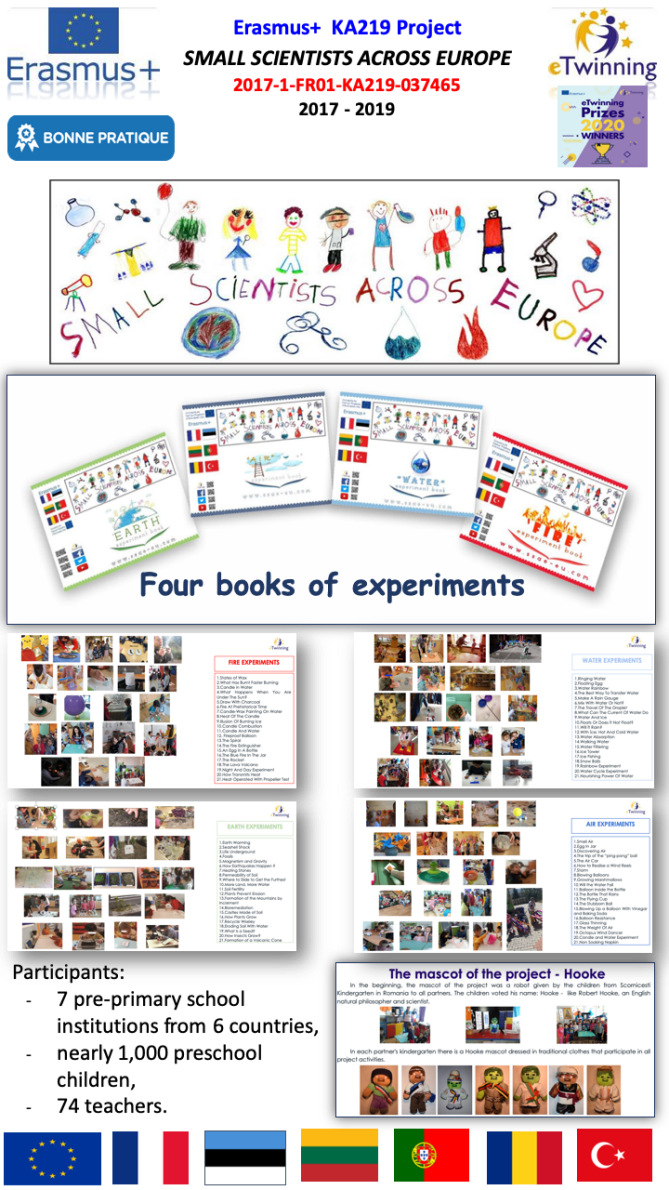Topic(s) addressed
This project, which revolved around the 4 scientific themes of water, earth, air, and fire, allowed for an experimental and investigative approach to science, combined with the use of technological tools in its communication, sharing, and implementation.
Target groups
The project was aimed at kindergarten children aged 3-6, and brought together 1000 children from 6 different nationalities: French, Portuguese, Romanian, Turkish, Lithuanian, and Latvian. The Turkish school in particular caters exclusively to children with special education needs.
Methodologies
The project aimed at contributing, or at the very least providing, an idea of how to develop a model for STEM learning and interdisciplinary approach for early childhood education. In this regard, the project’s primary undertaking was to adapt scientific definitions and theories (which are highly abstract considerations in relation to the preschool curriculum) through the use of play and experiments, and to apply said knowledge towards environmental care. Over the course of the project, we employed various methods and techniques (exploration, experiments, observation, “mind–hedgehog”), to increase awareness of the theme and to motivate participants. The sharing of photos and videos fascinated children and increased their desire to learn, with the videoconferencing session being a particularly exciting experience. The project proved to be fairly challenging, not only for the children and teachers involved, but also for parents who had been invited to participate in several of its activities.
Environments
The project was registered on the eTwinning platform to ensure visibility to all stakeholders and to ensure a safe working environment; additionally, the social network groups Facebook and Twitter were used for communication activities and for resource sharing, production, and dissemination. A number of tools were engaged in the development of online games, the diffusion of outputs (setting up of a YouTube channel), and in the development of a website to disseminate the project’s results. Students were able to participate in online events via videoconferencing, play online games, watch videos, and create games for partner students. Tools were also used in the creation of our final products: interactive books on experiences, and stories and videos for our YouTube channel. Lastly, the Google Doc platform was used for participatory contribution as well as online collaborative work among partner teachers.
Teachers
All project participants experienced an increase in their language and computer skills, and a strengthening of their psychological profiles, with teachers and pupils having acquired a European dimension to education, working, and joint cooperation towards a common European future. Furthermore, the participation of 6 different European nations allowed for the broad familiarisation of participants with various education systems, lifestyles, customs, and traditions.
Impact
The project’s implementation resulted in a number of outcomes, including the development of pre-schoolers’ scientific skills; the promotion of foreign language learning and diversity; the learning of digitised content and ICT promotion; the integration of specific project content into group activities of pre-school children through scientific experiments adapted to the pre-school level; study visits to specific places and specialist visits to the kindergarten; the creation of posters promoting environmental care; and, the creation of promotional material such as posters, PowerPoint Presentations, brochures and videos. The project also contributed to a broadening of the community’s experience through institutional cooperation between parents and museums, the planetarium, the aquarium, national protection agencies and NGOs, while fostering increased openness to the European community through collaborative efforts between project partners as well as networking initiatives with the communities within which they are located. The project’s results were presented and disseminated to stakeholders in the local education community (families, the town hall, district and country councils) and education specialist circles through professional development meetings and exchanges, in the interest of facilitating the replication of best practices, and analysing the potentialities of new approaches and pedagogical models. Furthermore, teachers shared their ICT competences among colleagues with regard to the eTwinning platform, as well as the use of programmes for the development of computer games and videos. Throughout the project, teachers cooperated and assisted each other with the development of documents, photos, videos and other such output, with several European schools having disseminated project information beyond their country’s borders. In total, 2000 books for local schools were printed, with digital versions distributed to a wide audience – including through a website and a globally accessible social media platform. In sum, a number of children’s skills were improved such as critical thinking, problem solving, interpretation, reflection, as well as their understanding of the connection between cause and effect. A notable development in their imagination and creativity was also observed over the course of the project. Children also benefitted from significant cultural enrichment through the sharing of traditions, cultures of partner countries, and the development of transdisciplinary skills such as socialisation, sharing, and language.
- Reference
- 2017-1-FR01-KA219-037465
- Project locations
- France
- Project category
- Early childhood education and care
- Project year
- 2021
Stakeholders
Participants
Agrupamento de Escolas Rainha Santa Isabel
- Address
- Portugal
Grădinița cu Program Prelungit Nr. 3
- Address
- Romania
Grădinița cu Program Prelungit Scornicesti
- Address
- Romania
Hüma Hatun Özel Eğitim Anaokulu
- Address
- Türkiye
Kauno lopšelis-darželis „Giliukas”
- Address
- Lithuania
Preschool Põngerjas
- Address
- Estonia

